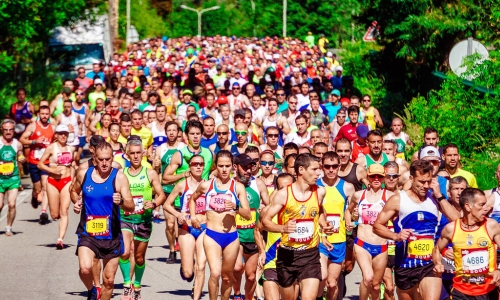Do you sometimes tend to use the bathroom more before the start of your race and wonder what could be causing this? Or do you just wonder why there are always such long lines at the toilets just before any race? Nervousness may not only be to blame but also the inappropriate composition of the pre-race diet.
Summary
- Unsuitable pre-race diet: heavy and fatty food, especially with a lot of hard-to-digest protein, can cause intestinal problems before the race.
- Sugar alcohols (polyols): sweeteners such as maltitol, xylitol, sorbitol, etc. contained in 'protein' foods can have laxative effects, especially in people with more sensitive digestion. Examples include protein bars, protein 'nut' spreads, and sports gels.
- Artificial ingredients and sweeteners: pre-race consumption of products with artificial sweeteners and ingredients such as energy shots, magnesium shots, or isotonic drinks can cause intestinal upset, especially if the person is not used to these products. The caffeine in energy shots helps release the hormone gastrin. Gastrin increases intestinal peristalsis and thus speeds up emptying. This, combined with exercise, which also stimulates peristalsis, may not be the most pleasant experience.
- Recommendations for competitors: It is important not to experiment with new foods before a race and to stick to a proven diet. Eating clean, minimally processed foods and avoiding artificial substitutes and sweeteners is recommended.
If you ate a heavy, fatty meal the night before the race with a lot of hard-to-digest protein (e.g., red meat), then you may not have had an easy race morning before the start, not to mention you probably didn't sleep well. However, if you tried to stick to easily digestible foods the day before the race as well as during breakfast and you still ran to the toilet every other minute, you need to ask yourself what's really behind your intestinal discomfort.
The culprit may be sugar alcohols
Watch out for the so called called polyols, used as sweeteners in many protein foods. These include maltitol, xylitol, sorbitol, and others. The back of the product packaging legally states that "excessive consumption may cause laxative effects". However, some people may be more sensitive to their consumption than others, and consuming smaller amounts is enough to have an adverse effect.
Food products such as protein nut spreads (with a high amount of maltitol), protein bars, etc. may be the best examples of potential causes of your discomfort. In order to reduce the energy value and cost, manufacturers substitute nuts and other ingredients in certain amounts, for example, with maltitol. If you eat a larger portion of such a spread, for example, in yourpre-race porridge, you may be unpleasantly surprised by the laxative effects. The same applies to various sports gels containing polyols.
Have you ever wondered why there are such long queues at the toilets before a race?
In addition, many runners are happy to reach for so-called energy shots, magnesium shots, isotonic drinks, etc., which contain other artificial ingredients and sweeteners such as sucralose, Acesulfam K, aspartame, etc., before the start. One thing is for sure: if you are not used to consuming these products for a long time, you are more likely to find that they just won't work for you moments before the race.
It should also be noted that a magnesium shot, an energy shot, an isotonic drink, and other products of a similar nature that you consume just before the start will have no positive effect on your race result; they will only burden your stomach and, in many cases, cause the notorious running cramps in the intestines.
Many runners know that running speeds up the work of the intestines. The reasons why you can have a hard time during a race due to your bowel movements are usually a combination of an inappropriate pre-race diet and running itself, which speeds up peristalsis. That's why it's important to make sure that your pre-race diet has the right composition and quantity. Never experiment before a race; keep all foods, supplements, and drinks pre-tested during training.
How to prepare properly for the race in terms of diet can be found here.
Tip: Our recommendation is to eat "clean" food, as little industrially processed as possible. Avoid artificial substitutes and sweeteners. On behalf of our team, we can recommend that you try one of our nut butters where you won't find these artificial ingredients. We have tested the consumption of our nut butters on race day - they are easy to digest and provide the energy you need. You can learn more about the benefits of peanut butters here.
Zdroje:
- Jeukendrup, A. E. (2014). A step towards personalized sports nutrition: carbohydrate intake during exercise. Sports Medicine, 44(1), 25-33.
- Burke, L. M., & Maughan, R. J. (eds.). (2015). Sports Nutrition: More Than Just Calories - Triggers for Adaptation.
- de Oliveira, E. P., Burini, R. C., & Jeukendrup, A. (2014). Gastrointestinal complaints during exercise: prevalence, etiology, and nutritional recommendations. Sports Medicine, 44(1), 79-85.


 CZK
CZK
 EUR
EUR
 EUR
EUR



